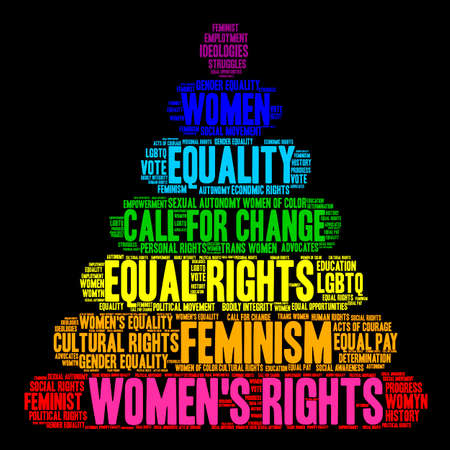‘Thorndike Barnhart Advanced Dictionary of 1974’ defines the word ‘Feminism’ as the belief that men and women should have equal rights and opportunity with other words and phrases like woman movement, women’s liberation, women’s rights, feminist movement, female emancipation, usable as synonyms. Wikipedia’ has a wider perspective defining feminism as involving a range of movements and ideologies that share a common goal to define, establish and achieve equal political, economic, cultural, personal and social rights for women.
It is saddening to know that there are some few women particularly in the western societies who wrongly believe the word feminism in a way stands for the denigration of men, having painted all women as victims. They are just ignoring the underlying meaning of the empowerment of women inherent in the word.
Throughout history, we have seen women actually have gone a long way down the road to promote and protect all women’s human rights and fundamental freedom.
Only in the late 19th century, it seemed that the efforts for women’s equal rights “coalesced into a clearly identifiable self-conscious movement or rather a series of movements”. The first ever feminism-wave is said to have emerged out of an environment of urban industrialization and liberal socialist politics with the goal to open up opportunity for women and with a special focus on sufferage.
In fact, women in the United States of America gained the right to vote, the greatest significance of the first wave of feminism, all because of the brave and determined individuals’ who had worked really hard to ensure that all women have the opportunity to participate in the American Democracy.
Since then, across the world, feminism waves have been rolling on with a variety of dominant issues like sexuality and reproductive rights and other, generally formed by post colonial and post modern thinking among the women groups.
Credit should be given to those generations of so-called women pioneers for their amazing courage, daring to make a difference against all odds, threats and challenges whatsoever. Those fore-mothers of feminism greatly deserve our due respect and recognition as they all have advocated for the “dignity”, intelligence, and the basic human potential of female sex”. In fact they had broken many barriers and paved the way for next-generation feminists in their fight to achieve equal rights and dignity of women.
The Universal Declaration of Human Rights adopted seven decades ago has marked an important milestone for women’s rights. Its Article one begins with the statement: “All human beings are born free and equal in dignity and rights.”
Comparatively women of the 21″ century tend to feel more equal and empowered with the opportunity to express themselves than in previous times, thanks to those women’s rights advocates of the past. That seems really encouraging for those who favour feminism.
In spite of all the continuing efforts to put down gender inequality over the years, the world has been still witnessing many heart-rending cases worldwide of mistreatment of women and girls-barbaric and cruel practice of genital mutilation, domestic violence, child marriages and female infanticides, rapes and sexual abuses, human trafficking and many other horrendous crimes against women and girls.
Feminism should be given more attention and the push for it, greatly strengthened across the world in order to be able to spell out many fundamental truths. It is disappointing and frustrating to know that gender inequality related problems, insidious and complex, have been touching the lives of men as well as women and children.
We can’t ignore the staggering statistics on violence and discrimination against women and girls together with the devastating scale of the problem in the world, let alone the subtle but still corrosive gender imbalance usually found in the areas of parental roles and responsibilities, economic opportunity, educational attainment, health and political empowerment, etc.
All the world’s people must be engaged in if we want to fix the problems women face in the world. According to one New York Times columnist, Charles M. Blow, fighting female objectification and discrimination and violence against women isn’t simply the job of women: it must also be the pursuit of men. “He added that not all men are part of the problem, but all men, must be part of the solution and that we should all be feminists”.
I think his words seem to be completely true. Every one including the stakeholders from policymakers and world leaders, governmental organizations, non-governmental organizations, civil societies, business people to individuals should join in the concerted effort in getting rid of gender inequality. Besides, the undesirable feeling of indifference and sticking to the concept of neutrality need to be crashed down as much as possible.
Human nature is such that majority of people regardless of race, sex, and religion generally believe the plight of the oppressed is solely the business of the oppressed and the society in which that oppression is born and grows, thereby staying aloof, silent and indifferent.
We, both males and females, need to be feminists. Among the contemporary advocates of feminism, Emma Watson, British actress and a Goodwill ambassador for UN women, has been one of my favorites. In March 2015, in connection with the International Women’s Day commemoration ceremony, she had firmly urged more men and boys to take a stand for women’s rights and be proud to be feminists in a bid to add momentum to a global campaign to unite men and women for gender equality.
Her voice spelled out loud and strong.
“Men often think that feminism is a women’s word, but if you stand for gender quality, you are a feminist.”
So let’s all be feminists.
It may be a long way for the world before all women can be treated with basic respect.
From a tiny sessamin seed, we can’t expect oil.
Yet with millions and millions of them, we could expect it in no time. We will eventually achieve a more equal world-Planet 50!

